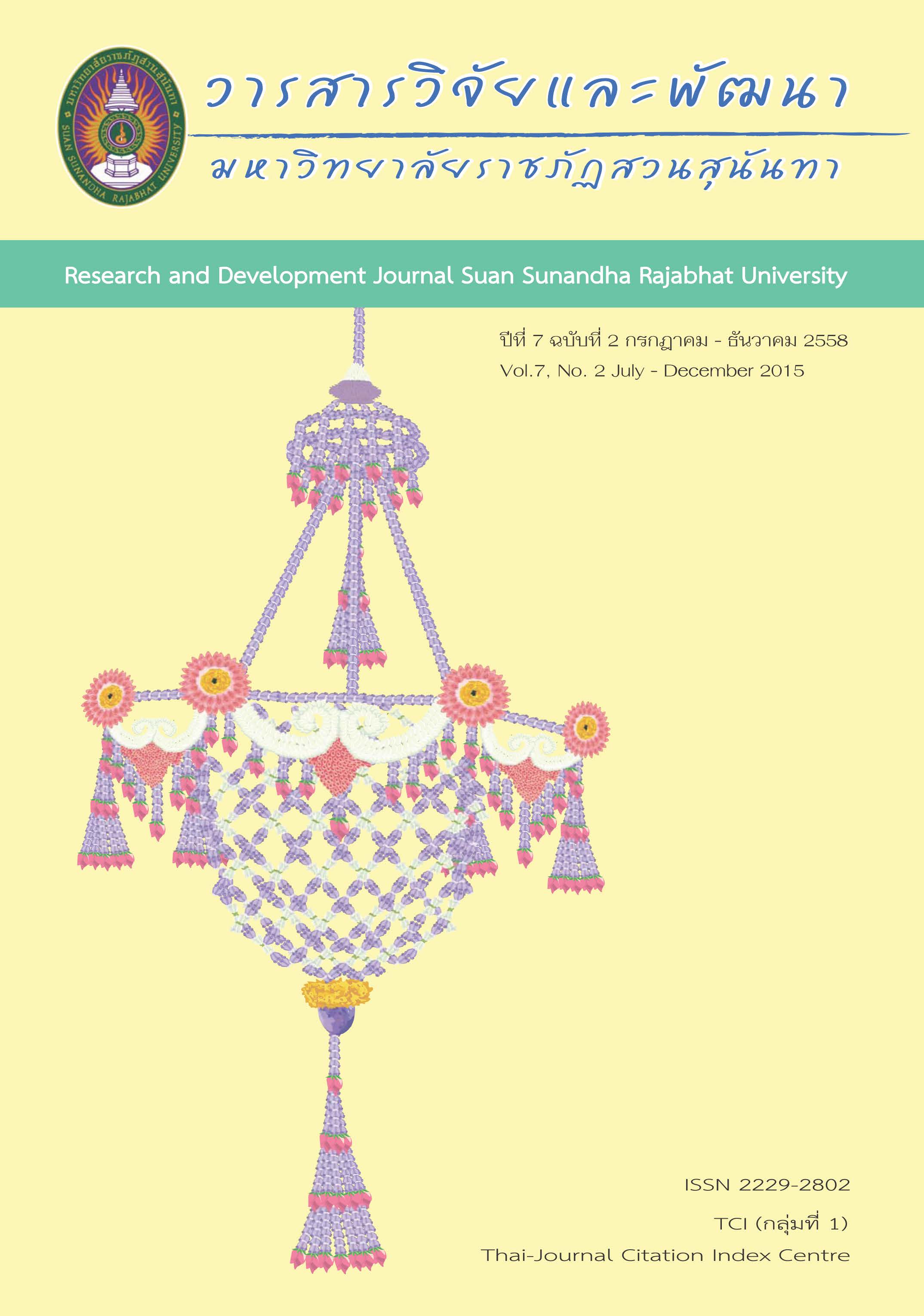ทัศนคติ แรงจูงใจ และการสนับสนุนจากบิดามารดาที่มีต่อการเรียนภาษาอังกฤษของนักศึกษาระดับปริญญาตรี
คำสำคัญ:
ทัศนคติ; แรงจูงใจ; การสนับสนุนการบิดามารดา การเรียนภาษาบทคัดย่อ
ใจ และการสนับสนุนจากบิดามารดาที่มีต่อการเรียนภาษาอังกฤษของนักศึกษาในระดับปริญญาตรีของมหาวิทยาลัยเอกชน ศึกษาความแตกต่างระหว่างเพศชายและเพศหญิงในปัจจัยเหล่านี้ รวมทั้งศึกษาความสัมพันธ์ของปัจจัยดังกล่าว โดยเก็บข้อมูลจากนักศึกษาชั้นปีที่ 1 จำนวน 411 คน ที่ลงทะเบียนเรียนวิชา EN011 ด้วยแบบสอบถามมาตราส่วนประมาณค่า 5 ระดับ และนำมาวิเคราะห์หาค่าเฉลี่ย ทดสอบค่าทีและหาค่าสัมประสิทธิ์สหสัมพันธ์ของเพียร์สัน ผลการวิจัยพบว่า นักศึกษามีทัศนคติต่อการเรียนภาษาอังกฤษอยู่ในระดับปานกลาง และมีแรงจูงใจและการสนับสนุนจากบิดามารดาในระดับสูง โดยที่นักศึกษาชายได้รับการสนับสนุนจากบิดามารดาสูงกว่านักศึกษาหญิงอย่างมีนัยสำคัญทางสถิติที่ระดับ .05 ในขณะที่ไม่พบความแตกต่างในเรื่องเพศของนักศึกษาต่อทัศนคติและแรงจูงใจ นอกจากนี้ ผลการวิจัยพบความสัมพันธ์เชิงบวกระหว่างการสนับสนุนจากบิดามารดากับแรงจูงใจในการเรียนภาษาอังกฤษ
เอกสารอ้างอิง
involvement on students’ learning
abilities and achievement in the
English subject. International Journal of Social and Humanity, 6(2), 103-106.
Akram, M & Ghani, M. (2013). Gender and
language learning motivation.
Academic Research International, 4(2),
536-540.
Behzadi, A. (2013). Iranian English learners’
motivation to learn English in higher levels. Indian Journal of Fundamental
and Applied Life Sciences- October-
December, 3(4), 148-157.
Bidin, S., Jusoff, K.,Aziz, N.A., Salleh, M.M. & Tajudin, T. (2009). Motivation and attitude in learning English among
UiTM students in the northern
region of Malaysia. English Language
Teaching, 2(2), 16-20.
Bronstein, P., Ginsburg, G.S. & Herrera, I.S. (2005). Parental predictors of motivational orientation in early
adolescence: A longitudinal study.
Journal of Youth and Adolescence, 34(6), 559-575.
Chalak, A. & Kassaian, Z. (2010). Motivation and attitudes of Iranian
undergraduate EFL students towards learning
English. GEMA Online Journal of Language Studies, 10(2), 37-56.
Cremades,J.G., Donlong, C.J. & Poczwardowski, A. (2013). Parental Involvement and
gender differences in the psycholo-
gical profile of freshmen collegiate
athletes . Journal of Sport and Health Science, 2, 160-167.
Gardner, R.C. (1985) Social psychology and language learning: The role of attitude and motivation. London:
Edward Arnold.
Gardner, R.C. (2006). The socio-educational
model of second language acquisition:
A research paradigm. EUROSLA Year Book, 6, 237-260.
Gardner, R.C. (2008). Individual differences
In second and foreign language
learning. In N. Van Deusen-Scholl &
N.H. Hornberger (Eds.), Encyclopedia of Language and Education, 4[Second
and Foreign Language Education], 29-40.
Gardner, R.C & Lambert, W.E. (1972).
Attitudes and motivation: Second
Language learning. Newbury House.
Hashwani, M. S. (2008). Students’ attitudes, motivation and anxiety towards
English language learning. Journal of
Research and Reflections in Education,
2(2), 121-144.
Jain, P. & Kaur, K.T. (2014). Parental
encouragement among adolescents:
A study of locale and gender
differences. Asian Journal of Home
Science, 9(1), 227-231.
Jeffs, T., Behrmann, M. & Bannan-Ritland, B. (2006). Assistive technology and
Literacy learning: Reflections of
parents and children. Journal of
Special Education Technology, 21(1),
37-44.
Khan, A., Ahmad, R., Hamdan, A.R. & Mustaffa, M.S. (2014). Educational encouragement, parenting styles, gender and ethnicity
as predictors of academic achievement among special education students.
International Education Studies, 7(2),
18-24.
Krashen, S. (1985). The input hypothesis:
Issues and implications. New York:
Longman.
Mormori, P. (2007). Parental Encouragement in foreign language learning: The Greek case. International Journal of Learning, 14(8), 245-254.
Nair, G.K.S., Setia, R., Mohamad, R., Kadir, Z.B.A, Luqman, A., Vadeveloo, T. & Ngah, H.C. (2014). Attitude, parental encouragement and perception of the
importance of English in English
language learning. Asian Social Science,
10(3), 1-8.
Narayanan, R, Nair, N.R. & Iyyappan, S. (2008). Some factors affecting English learning at tertiary level. Iranian Journal of
Language Studies (IJLS), 2(4), 485-512. Office of National Education & Standards
And Quality Assessment (Public
Organization) (2013). O-Net scores
Report. Retrieved May 28, 2015,
from http://203.144.163.91/ onesqa/th/download/index.php?Download
GroupID=121
Paran, G. & Tibli, P. (2009). Perceived
parental encouragement, motivation and
attitudes towards learning English
language among tertiary students.
Proceedings of the 2nd International
Conference of Teaching and Learning (ICTL),
INTI University College, Malaysia, 1-15.
Pineda, A.S. (2011). Attitude, motivation, and English language learning in a Mexican
college context .A dissertation
submitted to the Faculty of the Graduate
Interdisciplinary Doctoral program in second language acquisition and
teaching, The University of Arizona.
Reece, I. & Walker, S. (1997). Teaching, training
and learning: A practical guide. (Third Ed.). Great Britain: Business
Education Publishers Limited.
Roth, B. (2008). The importance of parental encouragement and support. Retrieved June 7, 2015 from
http://www.selfgrowth.com/articles/ The_Importance_Of_Parental_
Encouragement _and_Support.html
Sayadinan, S & Lashkarian, A. (2010). Investigating attitude and motivation of Iranian University Learners toward English as a foreign language.
Contemporary Issues In Education
Research. January, 3(1), 137-147.
Saville-Troike, M. (2006). Introducing second
language acquisition Cambridge: Cambridge. University Press .
Sekar, P. & Mani, S. (2013). Influence of gender on parental encouragement of higher secondary students. International
Journal of Scientific Research, 2(9).
Spolsky, B. (1989). Conditions for second language learning. Oxford: OUP.
Starks, D. & Paltridge, B. (1996). A note on using sociolinguistic methods to
study non-native attitudes towards
English. World Englishes, 15(2), 217-224.
Tahaineh, Y. & Daana, H. (2013). Jordanian undergraduates’ motivations and attitudes towards learning English in EFL context. International Review of Social Sciences and Humanities, 4(2),
159-180.
Vaezi, Z. (2009) Language learning
motivation among Iranian
undergraduate students.
Iranian Journal of Language Studies (IJLS),
3(1), 79-104.
Williams, M. & Burden, R.L. (1997). Psychology
for Language Teachers: A Social Constructivist Approach. Cambridge: Cambridge University Press.
ดาวน์โหลด
เผยแพร่แล้ว
รูปแบบการอ้างอิง
ฉบับ
ประเภทบทความ
สัญญาอนุญาต
บทความที่ได้รับการตีพิมพ์เป็นลิขสิทธิ์ของ สถาบันวิจัยและพัฒนา มหาวิทยาลัยราชภัฎสวนสุนันทา
ข้อความที่ปรากฏในบทความแต่ละเรื่องในวารสารวิชาการเล่มนี้เป็นความคิดเห็นส่วนตัวของผู้เขียนแต่ละท่านไม่เกี่ยวข้องกับมหาวิทยาลัยราชภัฎสวนสุนันทา และคณาจารย์ท่านอื่นๆในมหาวิทยาลัยฯ แต่อย่างใด ความรับผิดชอบองค์ประกอบทั้งหมดของบทความแต่ละเรื่องเป็นของผู้เขียนแต่ละท่าน หากมีความผิดพลาดใดๆ ผู้เขียนแต่ละท่านจะรับผิดชอบบทความของตนเองแต่ผู้เดียว





